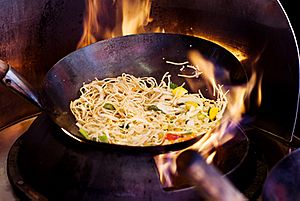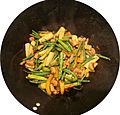Stir frying facts for kids
Stir frying is a quick and popular way of cooking that started in China. It involves cooking food in a small amount of very hot oil while constantly stirring it in a special pan called a wok. This cooking style has become popular all over Asia and in many Western countries too.
History of Stir Frying
People believe that wok or pan frying might have been used as far back as the Han dynasty (206 BC – 220 AD). But back then, it was mostly used for drying grains, not for cooking meals. It wasn't until the Ming dynasty (1368–1644) that the wok got its modern shape. This new shape made it perfect for cooking food quickly with hot oil.
For a long time, only rich families and restaurants could afford the oil and fuel needed for stir-frying. Most people cooked their food by boiling or steaming it. But as oil and fuel became more affordable in the 20th century, stir-frying became a very common way to cook. It also spread beyond Chinese communities and became popular around the world.
Why Stir Frying is Healthy
Stir-frying is often seen as a healthy way to cook, and Chinese food is known for this. It uses lots of fresh vegetables, meats, and fish. These ingredients are usually not too high in fat. The sauces used in stir-fries are also often light and not too rich. This means you can enjoy a tasty meal without getting too many calories, as long as you eat a reasonable amount.
When you stir-fry vegetables, they keep more of their good nutrients, like antioxidants, compared to boiling them. However, because you use oil, the fat content of the dish will be a bit higher than if you boiled or steamed the food.
Images for kids
-
A ginger chicken stir fry in a wok
-
During the Tang dynasty (618–907) chao referred to roasting tea leaves. Stir frying became a popular method for cooking food only later, during the Ming dynasty (1368–1644).
-
Stir frying can affect the nutritional value of vegetables. Fat content is increased because of the additional oil, and anti-oxidants are preserved better than by boiling.
See also
 In Spanish: Chao (salteado) para niños
In Spanish: Chao (salteado) para niños






